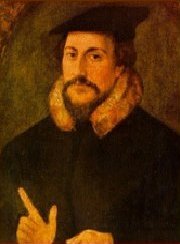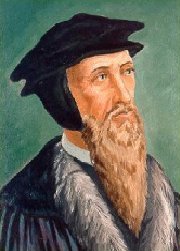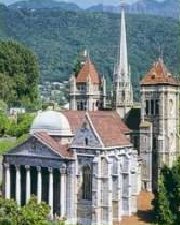John Calvin: A Short Biography

John Calvin, or to give him his proper French name, Jean Cauvin, was born in Noyon, Picardie, France on July 10th, 1509. This was an ancient cathedral city and was an important centre for the Roman Catholic church in Northern Europe. It was situated about 70 miles north-west of Paris. His father, noted for his severe nature, was secretary to the bishop. His mother was in contrast noted for her beauty and religious piety. However she died in 1518 while Calvin was still a young boy.
His father sent him to study in Paris from the age of 14, where he studied Theology. While at the university of Paris, Calvin came into contact with the teachings of Humanism that were flowing out from the Renaissance, and which were more and more coming into conflict with the old scholastic teachings of the Roman Catholic church of that period. Calvin became very attracted to these new teachings. he also came into contact with a movement led by Jacques Lefevre d'Etaples (1455-1536) that was seeking to try and reform the Roman Catholic Church. Calvin became closely attached to this reform group.

In about 1528, when Calvin was about 19 and had just completed his Master's degree in Theology, his father instructed him to leave Paris and go to the University of Orleans in order to study law instead of theology. His father had fallen out with the Catholic authorities in Noyon, and the consequence of this was that he no longer wanted his son to be a theologian!
During the next 3 years Calvin studied at Orleans, Bourges and Paris, earning his doctorate in law and his license to practice as a lawyer. However, his father died in 1531, and that left Calvin free to choose for himself the career that he wanted to pursue. He decided to move back to Paris and to pursue the life of a scholar, immersing himself in the study of the new Renaissance ideas.
Somewhere between 1532 and 1534 Calvin was converted. He became more closely attached to those in Paris involved with trying to reform the church, and who were advocating the teachings of Martin Luther in Germany. When Nicolas Cop was elected to be the rector of the university of Paris in 1533, he strongly advocated Lutheran reform. When Cop was accused of heresy by the authorities, Calvin was so closely associated with him and his movement for reform that he had to flee the city. He spent some time travelling round other parts of France, Italy and Switzerland. In 1534 he returned to his birthplace of Noyon, and there resigned from all the ecclesiastical positions that he held and that provided him with a living. From that moment on, Calvin had cut himself off completely from the Roman Catholic church.
The French King, Francis I, decided that the way to deal with the Protestants was to persecute them, imprison or kill them, and so Calvin was forced to leave France as there was no longer anywhere that he was safe. For the rest of his life he had to live as a refugee.
He first of all fled to the city of Basel in a Protestant region of Switzerland. There he wrote the first edition of The Institutes of the Christian Religion, which in French is known as the Institution de la Religion Chrétienne, in which he systematically summarised the Reformed Protestant teachings. This was first published in 1536 but he spent the rest of his life working on The Institutes, extending their scope more and more with each new edition. They were written in French, and originally addressed to the French king, Francis I.

In 1536 he met up with another French reformer, William Farel, in Geneva. At that time Geneva was an independent city-state. They set about introducing reformed principles to the city, affecting both its religious and civic life. These radical changes led to the expulsion of Calvin and Farel by the Genevan authorities in 1538. Calvin travelled to Strasbourg, where he became pastor of a church of French refugees, known as Huguenots. He worked there for 3 years with another famous reformer, Martin Bucer. During that time, in 1540, he married a widow by the name of Idelette de Bure.
In 1541 Calvin was invited back to Geneva by the city authorities, and he spent the rest of his life there establishing the form of Church government known as Reformed or Presbyterian, and developing and systematising the Reformed theology that has become known as Calvinism. This theology has greatly influenced Chritianity through the ensuing centuries, and many Christian denominations are based upon Calvinistic theology. The chief point of his theology, as for Martin Luther in Germany, was that the Bible has ultimate authority in defining what is the Truth, and how a church should be established and run.
During the time Calvin was in Geneva, the city became known throughout Europe as a place of refuge for persecuted Protestants.
His only son James died in infancy in 1542, and his wife, Idelette, died in 1549.
Calvin himself died in Geneva, Switzerland, on May 27th, 1564, and, at his own request, was buried in an unmarked grave somewhere in the city.




 Contact Us
Contact Us